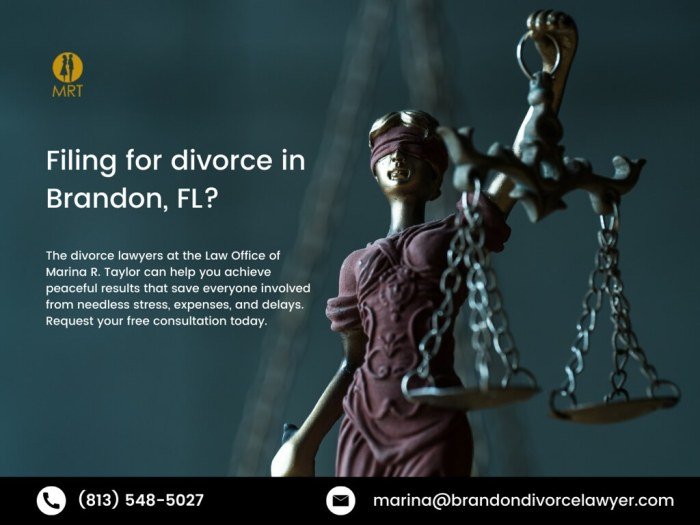
Navigating the complexities of family law can be daunting, especially in a vibrant city like Brandon, Florida. Whether you’re facing divorce, child custody disputes, or other family-related legal matters, understanding your rights and options is crucial. This guide provides a comprehensive overview of family law in Brandon, Florida, offering insights into common cases, legal processes, and how to find the right legal representation to advocate for your best interests.
From understanding the nuances of Florida’s family law statutes to selecting a qualified attorney, this resource aims to empower you with the knowledge needed to make informed decisions during this challenging time. We’ll explore various aspects of family law, including divorce proceedings, child custody arrangements, property division, and the crucial role of legal counsel in achieving favorable outcomes. We will also address frequently asked questions to clarify common concerns and provide practical guidance.
Brandon Florida Family Law Attorney Overview
Family law in Florida governs the legal aspects of family relationships, encompassing a broad range of issues that significantly impact individuals and families. These legal matters often involve high emotional stakes and require careful navigation of complex legal procedures. A skilled attorney is crucial for ensuring the best possible outcome.
Florida’s family law system addresses matters such as divorce, child custody, child support, alimony, and the division of marital assets. The specific laws and procedures can be intricate, and the consequences of legal decisions can be long-lasting.
Services Offered by a Brandon Family Law Attorney
A Brandon family law attorney offers a comprehensive suite of legal services designed to assist clients in navigating the complexities of family law matters. These services are tailored to meet the unique needs of each individual case, ensuring clients receive personalized and effective legal representation. The attorney’s role extends beyond simply representing clients in court; it includes providing guidance, support, and strategic planning throughout the legal process.
Common Family Law Cases in Brandon, Florida
Brandon, Florida, like many other communities, experiences a diverse range of family law cases. These commonly include divorce proceedings involving the division of property, both tangible assets and debts, as well as disputes concerning child custody and support arrangements. Cases involving high-net-worth individuals often require specialized expertise in asset valuation and complex financial matters. Additionally, modifications to existing orders, such as changes to child support or custody schedules, are frequently handled by Brandon family law attorneys. Domestic violence cases and pre-nuptial agreements also fall under the purview of family law and are frequently encountered. Cases involving paternity disputes and adoption proceedings are also common.
Importance of Choosing a Qualified Attorney
Selecting a qualified and experienced family law attorney in Brandon is paramount for several reasons. First, a knowledgeable attorney possesses a deep understanding of Florida family law statutes and precedents, ensuring that your rights are protected and that you are presented with the most effective legal strategies. Second, an experienced attorney can effectively negotiate settlements and represent your interests in court, potentially saving you time, stress, and resources. Third, an attorney can help you navigate the emotional challenges of family law cases, providing support and guidance during a difficult time. Finally, a qualified attorney can ensure that all legal procedures are followed correctly, preventing potential errors that could negatively impact your case. Choosing an attorney with a proven track record of success in similar cases significantly increases your chances of achieving a favorable outcome.
Types of Family Law Cases

Family law encompasses a broad range of legal matters affecting families. Understanding the different types of cases and the legal processes involved is crucial for navigating these often complex and emotionally charged situations. This section will Artikel some of the most common types of family law cases, highlighting their unique challenges and legal procedures.
Comparison of Divorce, Child Custody, and Child Support Cases
The following table compares and contrasts three frequently encountered family law cases: divorce, child custody, and child support. While often interconnected, each case type has distinct legal considerations and processes.
| Case Type | Common Issues | Legal Processes | Attorney Roles |
|---|---|---|---|
| Divorce | Division of marital assets (property, debt), alimony (spousal support), child custody and support arrangements. | Filing a petition for dissolution of marriage, discovery (exchanging information), negotiation, mediation, or trial. | Negotiating settlements, representing clients in court, preparing legal documents, advising clients on their rights and options. |
| Child Custody | Legal custody (decision-making authority) and physical custody (where the child resides), visitation schedules, parental responsibility. | Filing a petition for custody, investigation by a guardian ad litem (if necessary), mediation, trial. | Advocating for the client’s desired custody arrangement, presenting evidence to the court, protecting the child’s best interests. |
| Child Support | Determining the amount of financial support each parent will provide for the child, enforcement of support orders. | Filing a petition for support, income verification, calculation of support guidelines, modification of existing orders. | Calculating support obligations based on state guidelines, negotiating support agreements, representing clients in court to enforce or modify orders. |
High-Net-Worth Divorce Cases
High-net-worth divorce cases present unique challenges due to the complexity of dividing significant assets. These cases often involve extensive discovery processes to identify and value assets, potentially including businesses, real estate holdings, investments, and intellectual property. Disputes can arise over the valuation of these assets, leading to protracted litigation and substantial legal fees. The need for specialized expertise in areas such as business valuation and tax implications further complicates these cases. For example, a dispute over the valuation of a family-owned business could involve expert testimony from accountants and financial analysts, significantly increasing the time and cost of the proceedings.
Establishing Paternity in Florida
Establishing paternity in Florida legally determines the father of a child. This is crucial for child support, custody, and inheritance rights. Paternity can be established voluntarily through an acknowledgment of paternity form signed by both parents, or through a legal process involving genetic testing (DNA) if there is a dispute. A court order is necessary to officially establish paternity. If a paternity test is ordered, the court will ensure that proper chain of custody is maintained to ensure the integrity of the results. The process involves filing a petition, serving the other party, and attending court hearings if necessary.
Adoption Procedures in Florida
Florida offers several adoption pathways. Agency adoptions involve licensed child-placing agencies that facilitate the matching of children in need of adoption with prospective parents. Private adoptions, often involving family members or close friends, require a similar court process but with a more streamlined approach. Stepparent adoptions allow a stepparent to legally adopt a stepchild, requiring consent from the biological parent who is not the stepparent and the child if they are of a certain age. Adult adoptions involve adults adopting other adults, often for estate planning purposes or to establish a legal relationship. Each type of adoption involves a rigorous home study process to ensure the safety and well-being of the child, as well as a court hearing where the judge will make a final determination.
Finding the Right Attorney

Navigating the complexities of family law can be overwhelming, making the selection of a qualified and experienced attorney crucial. Choosing the right legal representation can significantly impact the outcome of your case. This section provides a structured approach to finding a suitable family law attorney in Brandon, Florida.
Finding the right attorney requires careful research and consideration. A systematic approach will help you identify an attorney who understands your needs and can effectively advocate for your best interests.
Attorney Research and Selection Steps
- Identify Your Needs: Clearly define the specific legal issues you are facing. Understanding the type of case (divorce, child custody, adoption, etc.) will help you focus your search on attorneys specializing in those areas.
- Online Research: Utilize online legal directories, state bar association websites (like The Florida Bar), and online search engines to locate family law attorneys practicing in Brandon. Look for attorneys with experience in your specific area of concern.
- Review Attorney Profiles: Carefully examine each attorney’s profile, paying attention to their experience, qualifications, areas of expertise, and client testimonials. Look for consistent positive feedback and a clear demonstration of their skills and knowledge.
- Contact Potential Attorneys: Reach out to several attorneys who seem like a good fit. Most offer initial consultations, often at no cost or for a reduced fee. This allows you to discuss your case and assess their suitability.
- Schedule Consultations: Attend consultations to meet the attorneys personally, discuss your case in detail, and ask clarifying questions. This will allow you to evaluate their communication style, responsiveness, and understanding of your situation.
- Compare and Contrast: After your consultations, compare and contrast the attorneys you met. Consider their fees, experience, communication style, and overall comfort level. Select the attorney who best meets your needs and with whom you feel most comfortable.
Criteria for Evaluating Potential Attorneys
Several key factors should guide your decision-making process when evaluating potential attorneys. These factors will ensure you choose someone who possesses the necessary skills and experience to effectively handle your case.
- Experience and Specialization: Look for attorneys with significant experience in family law and a proven track record of success in cases similar to yours. Specialization in specific areas (e.g., high-net-worth divorce, complex custody disputes) is beneficial if your case involves those complexities.
- Client Testimonials and Reviews: Positive reviews and testimonials from past clients provide valuable insight into an attorney’s professionalism, communication skills, and overall effectiveness. Pay attention to both positive and negative feedback to get a balanced perspective.
- Communication Style and Responsiveness: Effective communication is crucial. Choose an attorney who is responsive to your calls and emails and communicates clearly and concisely. You should feel comfortable discussing your case with them openly and honestly.
- Fees and Payment Plans: Understand the attorney’s fee structure upfront. Inquire about hourly rates, retainer fees, and any potential additional costs. Discuss payment plans if necessary.
- Professionalism and Ethics: The attorney should maintain a high level of professionalism and adhere to ethical standards. Check with the Florida Bar to ensure there are no disciplinary actions against the attorney.
Questions to Ask Prospective Attorneys
Preparing a list of questions beforehand will ensure you gather all the necessary information during your consultations. Asking these questions demonstrates your proactive approach and allows for a comprehensive evaluation.
- What is your experience with cases similar to mine?
- What is your fee structure, and what are the anticipated costs of my case?
- What is your approach to resolving family law disputes, and do you prefer negotiation, mediation, or litigation?
- How will you keep me informed about the progress of my case?
- What is your availability, and how quickly can I expect a response to my inquiries?
- Can you provide references from past clients?
- What is your success rate in cases like mine?
Reviewing Online Attorney Profiles and Testimonials
Online resources provide valuable information, but it’s crucial to approach them critically. Consider multiple sources and look for patterns in the feedback to gain a well-rounded understanding.
When reviewing online profiles, look for details like years of experience, areas of specialization, professional affiliations, and client testimonials. Pay close attention to the details provided in testimonials – do they seem genuine and detailed, or are they overly generic and positive? Compare multiple reviews across different platforms (e.g., Avvo, Google My Business, Yelp) to get a more holistic view.
Legal Process and Procedures
Navigating the Florida family law system can be complex, but understanding the general processes involved can alleviate some anxiety. This section Artikels the typical steps in divorce, settlement negotiations, and litigation, along with the stages of a custody battle. Remember, every case is unique, and the specific procedures may vary depending on the circumstances. It is crucial to seek legal counsel for personalized guidance.
Filing for Divorce in Florida
Filing for divorce in Florida initiates a formal legal process. The process begins with the filing of a Petition for Dissolution of Marriage with the appropriate Florida court. This petition Artikels the grounds for divorce, requests for relief (such as alimony, child support, and property division), and other relevant information. The petitioner must serve the respondent (the other spouse) with a copy of the petition and a summons, officially notifying them of the lawsuit. The respondent then has a specific timeframe to file a response, outlining their position on the issues raised in the petition. Following the initial filings, the case progresses through various stages, including discovery (gathering evidence), negotiations, and potentially, trial.
Negotiating a Settlement Agreement
Many family law cases are resolved through negotiation and settlement rather than going to trial. Negotiations involve both parties (or their attorneys) discussing the issues and attempting to reach a mutually agreeable resolution. This often involves compromises on various aspects of the case, such as child custody, visitation schedules, child support, alimony, and property division. A successful negotiation culminates in a written settlement agreement that is legally binding. This agreement is then submitted to the court for approval and incorporation into a final judgment. The process can be facilitated by mediation, where a neutral third party assists in guiding the parties towards a resolution.
Litigating a Family Law Case
If negotiations fail to produce a settlement, the case proceeds to litigation. Litigation involves presenting the case before a judge or jury. This process includes extensive discovery, where both sides gather evidence through depositions, interrogatories, and document requests. The parties then present their case in court, including testimony from witnesses and the introduction of evidence. The judge or jury will then make a determination based on the evidence presented. Litigation can be lengthy, expensive, and emotionally draining. It’s crucial to have a skilled attorney to navigate this process effectively.
Stages of a Custody Battle
A custody battle can be a highly emotional and complex process. The stages typically involve:
- Initial Petition and Response: One parent files a petition requesting custody and visitation, and the other parent responds.
- Investigation and Discovery: Both sides gather information relevant to the case, such as financial records, evidence of parenting styles, and any relevant history of abuse or neglect. This often includes depositions of witnesses and other parties.
- Mediation or other forms of Alternative Dispute Resolution (ADR): Attempts are made to settle the case outside of court through mediation or other forms of ADR.
- Custody Evaluation (if ordered by the court): A professional conducts a thorough evaluation of the family and makes recommendations to the court.
- Trial (if necessary): If the case cannot be settled, a trial is held where the judge determines custody and visitation.
- Final Order: The court issues a final order outlining the custody and visitation schedule, child support obligations, and other related matters.
Common Legal Issues and Solutions
Navigating family law in Brandon, Florida, often involves complex and emotionally charged situations. Understanding common legal issues and potential solutions is crucial for making informed decisions and protecting your rights. This section will address some of the most frequently encountered challenges in family law cases.
Alimony and Spousal Support Disputes
Disputes over alimony (spousal support) are common in divorce proceedings. Florida courts consider several factors when determining whether to award alimony and the amount, including the length of the marriage, the earning capacity of each spouse, the financial needs of the recipient spouse, and the standard of living established during the marriage. Disagreements often arise regarding the duration of alimony payments (temporary, bridge-the-gap, rehabilitative, or permanent), the amount of the payment, and the circumstances under which payments can be modified or terminated. For example, a significant change in one spouse’s employment status might warrant a modification. A clear understanding of the relevant factors and the application of Florida’s alimony statutes is critical for achieving a fair and equitable outcome.
Property Division in Divorce
Equitable distribution of marital assets is a cornerstone of Florida divorce law. “Equitable” doesn’t necessarily mean equal; it means fair and just, considering the circumstances of the marriage and the contributions of each spouse. Determining what constitutes marital property (acquired during the marriage) versus separate property (owned before the marriage or received as a gift or inheritance during the marriage) can be complicated. Disputes frequently arise over the valuation of assets such as real estate, businesses, retirement accounts, and other investments. The division of debts is also a key consideration. For instance, a disagreement might arise over the valuation of a family business, requiring expert appraisal to ensure a fair division.
Child Visitation Schedules
Establishing a child visitation schedule that serves the best interests of the child is paramount. Factors considered include the child’s age, the parents’ work schedules, the distance between the parents’ residences, and the child’s relationship with each parent. Disputes often arise over the frequency and duration of visits, overnight stays, holidays, and school breaks. Florida courts prioritize creating a schedule that minimizes disruption to the child’s life and fosters a healthy relationship with both parents. For example, a co-parenting schedule might involve alternating weeks or a rotating schedule that accounts for school events and extracurricular activities.
Child Custody Disputes
Child custody cases can be highly contentious. Florida courts strive to determine a custody arrangement that prioritizes the best interests of the child. This involves considering the child’s physical and emotional needs, the parents’ ability to provide a stable and nurturing environment, and the child’s wishes (if the child is of a sufficient age and maturity). The court may award sole custody to one parent, joint custody (shared parental responsibility), or a combination of both. Disputes often arise over decision-making authority regarding the child’s education, healthcare, and religious upbringing. Mediation and collaborative law are often utilized to resolve custody disputes outside of court, minimizing the stress and potential trauma on the child. In cases involving allegations of abuse or neglect, the court’s priority shifts to ensuring the child’s safety and well-being.
Resources and Support

Navigating the complexities of family law can be emotionally and financially draining. Fortunately, various resources and support systems are available in Brandon, Florida, to assist individuals and families during this challenging time. Understanding these resources is crucial for obtaining the necessary help and guidance to successfully navigate the legal process.
Facing a family law matter can be overwhelming. Knowing where to turn for help is essential. The following resources provide vital support, from legal assistance to emotional counseling.
Relevant Resources in Brandon, Florida
Several organizations and services offer assistance to individuals facing family law issues in Brandon. These resources can provide crucial support, whether it’s legal advice, financial assistance, or emotional guidance.
- Legal Aid of Manasota: Offers free or low-cost legal services to low-income individuals. They provide assistance with various family law matters, including divorce, child custody, and domestic violence.
- The Florida Bar Lawyer Referral Service: Connects individuals with attorneys specializing in family law in the Brandon area. This service can help you find a qualified attorney who meets your specific needs and budget.
- Community Legal Services of Mid-Florida: Provides legal assistance to low-income individuals in several areas, including family law. They offer a range of services, from consultations to representation in court.
- Hillsborough County Clerk of Court: This office provides information on court procedures, filing fees, and other essential information related to family law cases in Hillsborough County, where Brandon is located.
- Local Bar Associations: The Hillsborough County Bar Association and other local bar associations often have resources and referral services to connect individuals with family law attorneys.
Local Support Groups and Organizations
In addition to legal resources, emotional support is vital during family law proceedings. These groups offer a safe and understanding environment to share experiences and receive encouragement.
- Support groups for parents going through divorce: Many community centers and churches offer support groups specifically for parents navigating the complexities of separation and divorce. These groups provide a space for sharing experiences, coping strategies, and emotional support.
- Domestic violence shelters and support services: Organizations like the Florida Coalition Against Domestic Violence offer resources and support for victims of domestic abuse, including legal assistance, shelter, and counseling.
- Mental health professionals: Therapists and counselors specializing in family issues can provide individual or family therapy to help manage stress, cope with emotional challenges, and improve communication during difficult times.
Applying for Legal Aid or Pro Bono Services
Legal aid and pro bono services offer free or low-cost legal representation to those who qualify based on income and other factors. The application process typically involves submitting an application demonstrating financial need and providing details of the legal issue.
The application process varies depending on the organization. Generally, applicants must provide documentation of income, assets, and the legal issue they are facing. Organizations will review the application to determine eligibility. If approved, legal aid or pro bono services may include legal representation, advice, and assistance with court filings.
A Support System in Action
The scene depicts a brightly lit, comfortable room in a community center. A group of families sits in a circle, engaged in a facilitated discussion. A warm, empathetic facilitator guides the conversation, offering support and validation. Children play quietly in a designated area nearby, supervised by a volunteer. The atmosphere is one of calm understanding and mutual support. Each family shares their individual struggles, finding comfort and strength in the shared experience. The room is filled with soft lighting, comfortable seating, and the quiet murmur of conversation – a sanctuary offering hope and practical advice amidst the turmoil of legal battles. The air is thick with empathy and a sense of community, reminding everyone that they are not alone in their journey.
Closing Summary
Successfully navigating family law matters requires careful planning, legal expertise, and a clear understanding of the processes involved. By carefully considering the information presented here, and by seeking the counsel of a qualified Brandon, Florida family law attorney, individuals can approach their legal challenges with confidence and a greater chance of achieving positive resolutions. Remember, seeking professional legal advice is paramount to protecting your rights and securing the best possible outcome for you and your family.
User Queries
What is the average cost of hiring a family law attorney in Brandon, Florida?
Attorney fees vary greatly depending on experience, case complexity, and the services required. It’s best to schedule consultations to discuss fees with several attorneys.
How long does a typical divorce case take in Brandon, Florida?
The timeframe depends on factors like the complexity of the case and whether it’s settled through negotiation or litigation. Uncontested divorces can be quicker than those involving significant disputes.
Can I represent myself in a family law case?
While self-representation is possible, it’s generally not recommended, especially in complex cases. Family law is intricate, and legal counsel can significantly improve your chances of a favorable outcome.
What are the grounds for divorce in Florida?
Florida is a “no-fault” divorce state, meaning that irreconcilable differences are sufficient grounds for divorce. No proof of wrongdoing is needed.





